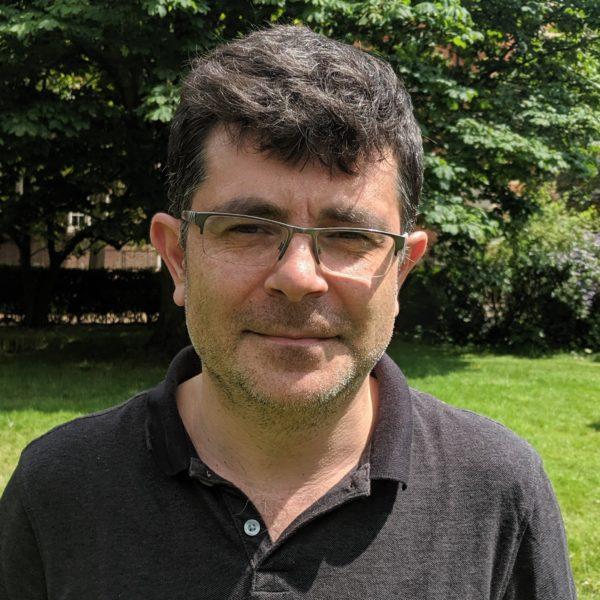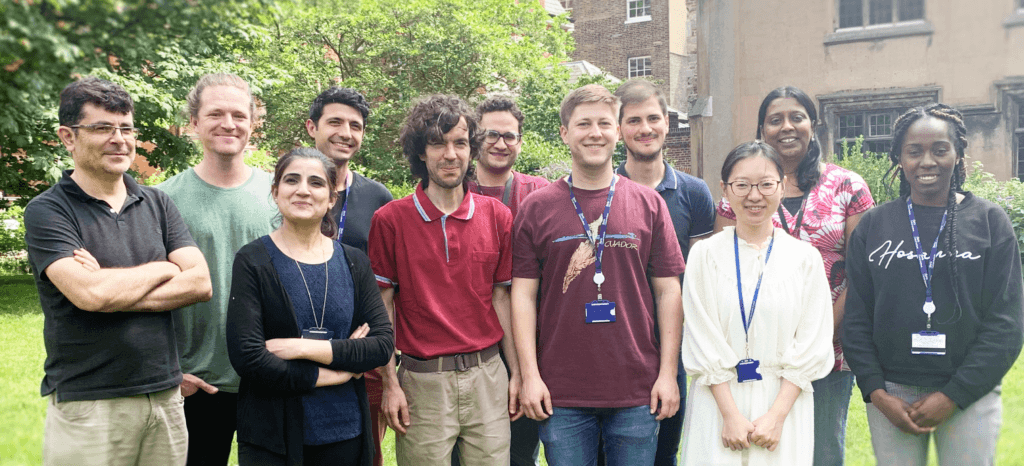
Professor Pedro R. Cutillas
BSc, PhD
Professor of Cell Signalling and Proteomics
Group Leader
Research Focus
My research group uses unique proteomics and computational approaches to understand how cell signalling pathways driven by the activity of protein kinases contribute to the development of cancer. Increasing this knowledge will be invaluable in advancing personalised cancer therapies.
Key Publications
Computational Analysis of Cholangiocarcinoma Phosphoproteomes Identifies Patient-Specific Drug Targets. Cancer Res (2021) 81(22):5765-5776. PMID: 34551960
Drug ranking using machine learning systematically predicts the efficacy of anti-cancer drugs. Nat Commun (2021) 12(1):1850. PMID: 33767176
Reconstructing kinase network topologies from phosphoproteomics data reveals cancer-associated rewiring. Nat Biotechnol (2020) 38(4):493-502. PMID: 31959955
Proteomic and genomic integration identifies kinase and differentiation determinants of kinase inhibitor sensitivity in leukemia cells. Leukemia (2018) 32(8):1818-1822. PMID: 29626197
Major Funding
- 2020-2023 - Blood Cancer UK, Signalling pathways that determine responses of AML cells to FLT3 inhibitors, £245,281
- 2018-2022- MRC Medical Research Council, Translational Biology iCASE Programme - Grant, £202,131.99
- 2017-2021- CRUK, £350,000
- 2017-2019- Barts Charity, Proteomics mass spectrometry for the Barts Post-Genomic Phenotype Unit, £371,000
Other Activities
- Turing Fellow (2018-)
- Co-founder and Director, Kinomica Ltd (2016-)
- Member of the Steering Committee of The London Biological Mass Spectrometry Discussion Group (LBMSDG)
- Co-founder and Director, Activiomics Ltd (2011-2014)
Research
I am interested in understanding how cell signalling pathways driven by the activity of protein kinases contribute to the development of cancer. Signalling pathways do not work in isolation but form a complex network of biochemical reactions that integrate extracellular signals into a coordinated cell biological response.
Essentially all cancers deregulate one or several components of this biochemical network, but unfortunately, cancers are heterogeneous in the way signalling is perturbed. In practice, this means that novel targeted therapies against signalling nodes do not work equally well in all patients. Even those patients that initially respond eventually develop resistance.
To understand the mechanisms underlying this heterogeneity, I developed methodology based on a technique named mass spectrometry and on computational science. These techniques can be used to measure how the signalling network is wired in individual cancer populations in a comprehensive and unbiased manner.
My group is now using these unique resources to investigate the fundamental properties of signalling networks and to understand how signalling heterogeneity in cancer (with particular focus on haematological malignancies) contribute to intrinsic and acquired resistance to compounds that target signalling enzymes.
Other Activities
- Turing Fellow (2018-)
- Co-founder and Director, Kinomica Ltd (2016-)
- Member of the Steering Committee of The London Biological Mass Spectrometry Discussion Group (LBMSDG)
- Co-founder and Director, Activiomics Ltd (2011-2014)
Major Funding
- 2020-2023 - Blood Cancer UK, Signalling pathways that determine responses of AML cells to FLT3 inhibitors, £245,281
- 2018-2022- MRC Medical Research Council, Translational Biology iCASE Programme - Grant, £202,131.99
- 2017-2021- CRUK, £350,000
- 2017-2019- Barts Charity, Proteomics mass spectrometry for the Barts Post-Genomic Phenotype Unit, £371,000
- 2015-2018- B.B.S.R.C., Systematic classificiation of phosphorylation sites for an integrative analysis of kinase signalling, £374,677
- 2015-2017- Barts Charity, Personalizing cancer treatments, £475,828
Recent Publications
Comparison of multiple modalities for drug response prediction with learning curves using neural networks and XGBoost Branson N, Cutillas PR, Bessant C Bioinformatics Advances (2024) 4(10) vbad190
Efferocyte‐Derived MCTRs Metabolically Prime Macrophages for Continual Efferocytosis via Rac1‐Mediated Activation of Glycolysis Koenis DS, de Matteis R, Rajeeve V et al. Advanced Science (2024) 11(10) 2304690
Allele-Specific Expression of Leukemia Genes Is Associated with Pathogenicity in Poor Risk AML Zheng J, Bewicke-Copley F, Vermeulen C et al. Blood (2023) 142(10) 1389
The XPO1-FOXC1-HOX Functional Axis Opens New Therapeutic Avenues to Treat DEK-NUP214 AML Patients Kaya F, Bewicke-Copley F, Izquierdo PC et al. Blood (2023) 142(10) 4302
Integrated multi-omics data reveals distinct regulatory signatures and signaling pathways of aryl hydrocarbon receptor interacting protein (AIP) knockout cells Barry S, Rai A, Haworth O et al. Endocrine Abstracts (10)
SET-PP2A complex as a new therapeutic target in KMT2A (MLL) rearranged AML Di Mambro A, Arroyo-Berdugo Y, Fioretti T et al. Oncogene (2023) 42(10) 3670-3683
Causal Role for Neutrophil Elastase in Thoracic Aortic Dissection in Mice Yang M, Zhou X, Pearce SWA et al. Arteriosclerosis Thrombosis and Vascular Biology (2023) 43(10) 1900-1920
S124: PHOSPHOPROTEOMICS ACCURATELY PREDICTS RESPONSES TO MIDOSTAURIN PLUS CHEMOTHERAPY IN TWO INDEPENDENT COHORTS OF FLT3 MUTANT-POSITIVE ACUTE MYELOID LEUKAEMIA Dokal A, Borek WE, Nobre L et al. HemaSphere 7(10) e3920765
Community detection in empirical kinase networks identifies new potential members of signalling pathways De Los Angeles Colomina Basanta C, Bazzi M, Hijazi M et al. PLOS Computational Biology 19(10) e1010459
In Silico Analysis Predicts Nuclear Factors NR2F6 and YAP1 as Mesenchymal Subtype-Specific Therapeutic Targets for Ovarian Cancer Patients Kassuhn W, Cutillas PR, Kessler M et al. Cancers 15(10) 3155
For additional publications, please click hereTeam
Postdoctoral Researchers
Dr Pedro Casado-Izquierdo , Dr Ana Levi
PhD Students
Mr Federico Pedicona, Mr Henry Gerdes
Mass Spectrometrist in this group
Dr Vinothini Rajeeve, Ruth Otunsola

Biography
I graduated with a PhD in 2004 from UCL. My studies (completed in the laboratories of Prof Mike Waterfield, Prof Rainer Cramer and Prof Al Burlingame) were on a project that investigated kidney physiology and were supervised by Prof Robert Unwin. I then completed postdoctoral training at the Ludwig Institute for Cancer Research (UCL branch).
In 2007, I became lecturer at the Centre for Cell Signalling and in 2010 I was promoted to Senior Lecturer. After a period in the MRC Clinical Sciences Centre (2012-2013), where I was Head of the Mass Spectrometry and Proteomics, I joined the Centre for Haemoto-Oncology in 2013 where I now lead the Integrative Cell Signalling and Proteomics Group.
I am part of the Programme Team for the Cancer Genomics & Data Sciences MSc Programme at BCI, Queen Mary University of London.
